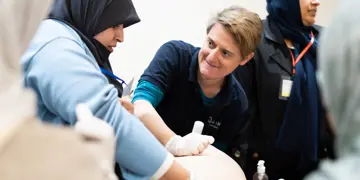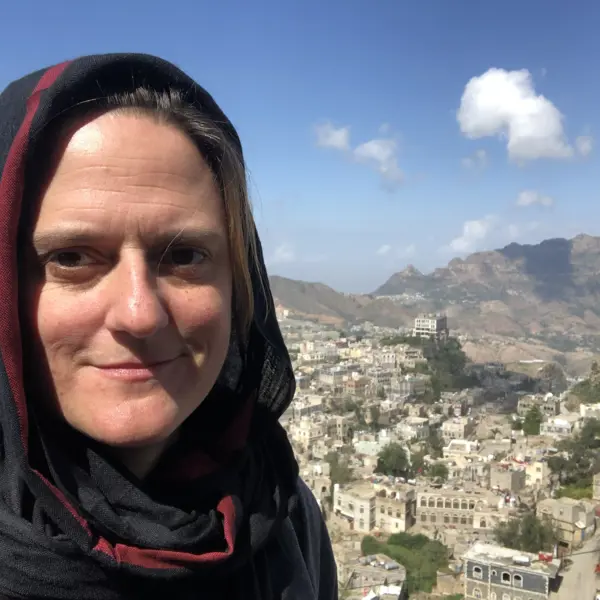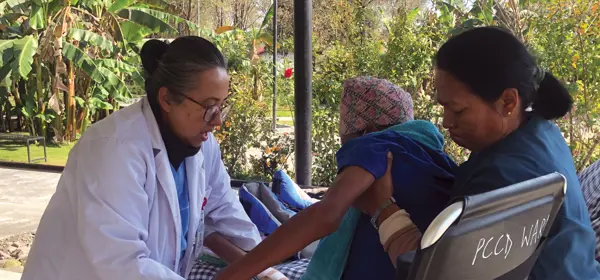War's forgotten victims
War's forgotten victims
Go to a conflict zone and you'll find a lot more than combat trauma to deal with. Babies continue to be born, often in appalling circumstances. Pippa Letchworth tells Jennifer Trueland how she trains doctors in obstetrics in some of the most challenging places on earth
‘If you are in a conflict zone, or whatever the humanitarian crisis is, and they put up a field hospital, the first operation that will be done will be a life-saving caesarean section. As a surgeon, you may want to go to a war zone and do plastics, but you need to be able to deliver a baby safely because women will be seeking healthcare wherever there is some sort of humanitarian catastrophe, whether natural or man-made. Women will still be in labour and will still be getting obstructed labours.’
Pippa Letchworth combines her job as a consultant in obstetrics and gynaecology at St Mary’s Hospital in London, with humanitarian work. Having volunteered for many years with organisations such as Médecins Sans Frontières – working in areas including Sierra Leone, Pakistan, the Democratic Republic of Congo and northern Nigeria – she is now faculty lead for obstetrics and gynaecology at the David Nott Foundation, which trains doctors in countries hit by conflict and catastrophe.
A common perception of conflict medicine is treating mostly young men with battle wounds. But, as Miss Letchworth points out, this is far from the case. Women are known to be particularly affected by conflict – around three quarters of displaced people are women and children, and one in five will be pregnant at any one time. This inevitably puts pressure on services where they end up. ‘Women displace themselves to keep themselves and their pregnancies and children safe,’ she says. ‘That makes them very vulnerable.’
A precious cargo
That’s one of the reasons why obstetrics is central to the David Nott Foundation’s mission. When The Doctor attended part of the foundation’s Hostile Environment Surgical Training course, which prepares doctors for working in emergency trauma in conflict and catastrophe situations, obstetrics formed a major part of the programme.
This is in large part down to the personal experience of charity founder David Nott, who found himself having to upskill in emergency obstetrics on his early missions to troubled areas.
‘David says the reason we focus on it is because some of the scariest things he’s done have been managing obstetrics,’ says Miss Letchworth. ‘And it’s a pivotal moment in a woman’s life. The most risky thing they will probably do is have a baby, and it’s massively high stress because you know that you’ve got super-precious cargo [ie, the baby] as well as maternal health to think about, so there’s a lot going on.’
This is the case in every conflict, she adds, and it’s much wider than dealing with the actual mechanics of delivering a baby. While men might be disproportionately affected by the direct effects of war – for example, sniper attacks, and battlefield injuries – women are affected more by the indirect effects, and their needs should not be ignored.
‘It literally doesn’t matter what conflict you’re talking about,’ says Miss Letchworth. ‘It’s the loss of structures that contribute to safe healthcare, the ability to get contraception. And rape has been used as a weapon of war since the dawn of time, in every single conflict that’s been documented. So, you’ve got gender-based violence, transmission of sexually transmitted disease, maternal and child healthcare. And if [women] can’t get contraception and have unintended pregnancies, you have a massive spike in unsafe abortions.’
Around 64 per cent of maternal mortality happens in fragile or conflict zones, says Miss Letchworth, and unsafe abortion is one of the top five killers of women in pregnancy worldwide. ‘People being educated and being offered contraception if they want it, and being able to access that in some sort of humanitarian crisis is arguably as important as the other bits, like delivering babies.’
You need to be able to deliver a baby safely because women will be seeking healthcare wherever there is some sort of humanitarian catastrophe
Pippa Letchworth
She cites one particular patient in Sierra Leone. ‘She was a young girl who had been made pregnant by her teacher and had sought an unsafe abortion through a local traditional practitioner across the way from her school. They had inserted something in her cervix and she came in massively septic, tachycardic, really, really unwell.
'In the UK she would have been in intensive care with inotropes and all these sort of things but these are settings where that is literally not available, so we gave her all the antibiotics we had and did a surgical management of miscarriage, which is actually a really simple thing to do. She survived, and she was fine.
‘These kind of things don’t even count in the data that people see because she wouldn’t [count] in morbidity and mortality because it was straightforward. But that’s just one story of many, and of course mostly it’s not me that’s delivering the healthcare – it’s the people who are there day in, day out, who do thousands and thousands of life-saving interventions really well. What we try to do is expand their repertoire and give them techniques that can help them keep people safe.’
Well supported
Saving the lives of women in childbirth goes far beyond that one pregnancy, she stresses. ‘The children of mothers who die have hugely increased mortality compared with those of surviving mothers. There are implications on childhood developmental stunting, higher levels of school drop-out and increased early marriage and risky early childbearing on an undeveloped pelvis. This is why I believe that maternal healthcare in conflict is more important than any other intervention.’
She takes a common-sense approach to her own safety while on missions abroad – she always follows security advice and does what she can to reduce risks to her personally, such as covering her face when she was working in Pakistan. ‘It’s not my culture to do that, but you do all these things to make you feel safe, to make sure you don’t feel massively at risk.
'I don’t feel I’ve been in a battle zone, as such, despite being in places like Ukraine and Yemen during active conflict, but we always have a really solid team that are with us, and local guys that help us with security. I have a massive trust in these people that are living and working in the area all the time because they really know what’s going on and have got to grips with it in a way we never will.’
I believe that maternal healthcare in conflict is more important than any other intervention
Pippa Letchworth
As well as working with the foundation behind the scenes, including producing and delivering training materials, Miss Letchworth goes on foreign missions around twice a year. Her employers and colleagues at Imperial College Healthcare NHS Trust are supportive, she says – but she stresses that it’s a huge privilege to be able to do what she does, and to meet doctors living and working in conflict zones.
‘The people who are there all the time are working really hard and are very capable doctors – what we’re there to do is share techniques and improve skillsets for the particular environments they are in,’ she says.
‘I feel very lucky that I have the chance to go to these places and see these things beyond what people can usually do. For example, we were in Syria earlier in the year. Who knows what the future holds, but at that moment it felt like an exciting time of freedom and positivity, where a lot of people were very excited about the future. Having been lucky enough to go and do the teaching and deliver the course, but also to experience these different cultures and go to places that other people would find it really difficult to access is a real privilege.’




